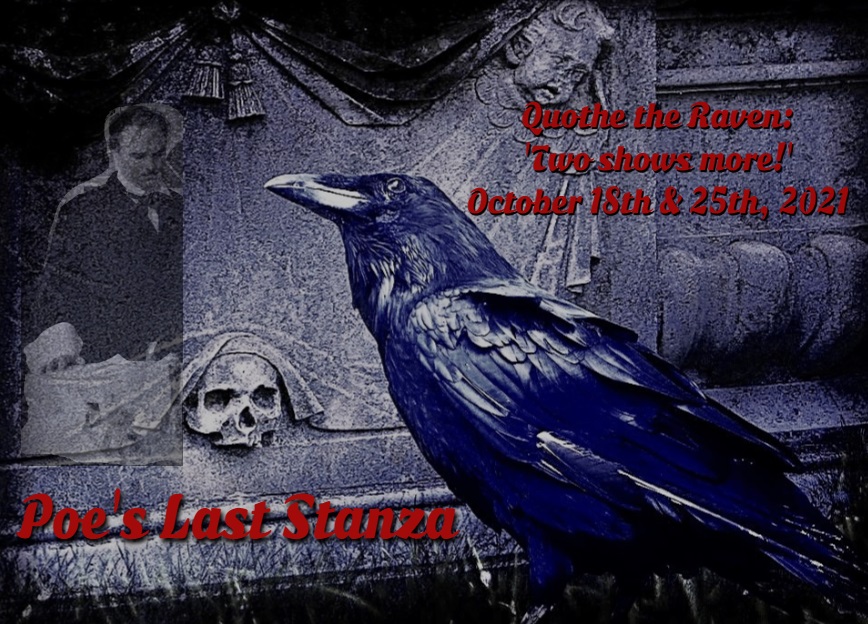“Words have no power to impress the mind without the exquisite horror of their reality.” –Edgar Allan Poe, The Narrative of Arthur Gordyn Pym.
When one twists darkened words of macabre and melancholy through the mind and round the tongue, one finds perhaps phantom shades of Baltimore’s beloved Edgar Allan Poe coming to light. Returning to the stage after two years’ hiatus, Do Or Die Productions is reviving their renowned production of Poe’s Last Stanza, written and directed by C.J. Crowe. An intimate evening spent in the company of the true great American literary horror master awaits those attending Poe’s Last Stanza this October. In a TheatreBloom exclusive interview, we’ve sat down with the company’s Poe-originator, John Kelso, and explored the darker recesses of his mind when it comes to playing the mysterious man of shadows.
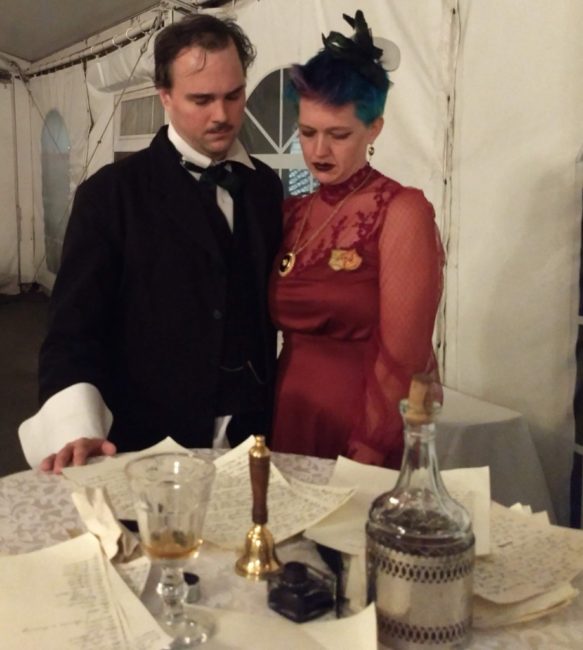
John Kelso: I’m John and depending on how you count I’ve been playing Poe in Poe’s Last Stanza for six or seven years.
What was it that drew you to the project?
John: I’ve always loved Poe. When I was in high school I used to carry around an unabridged works of Edgar Allan Poe, which was like a 1600-page paperback. I literally carried it around for years as I read through it. It was like the size of a small cinderblock. And I’ve always loved Poe. I remember C.J. (playwright C.J. Crowe) saying she was writing a show about Poe and I was interested. I was very interested but I didn’t want to seem desperate, so I didn’t speak up and say “Oh my God, C.J. Can I be in that show?” I played coy until she asked me and when she did, of course I said, “Yeah, I’d love to do that.” And that was how it all got started.
Seeing as you are well versed with his works, do you have a favorite Edgar Allan Poe story or poem that speaks to you?
John: My favorite Poe poem is “The Conqueror Worm”, which no one knows. It’s a metaphor of human life as a theatre. The creatures of heaven are the audience in the theatre and the show they watch is human misery and the hero of the play is the Conqueror Worm because in the end we all end up being eaten by worms. I think it paints a spectacular picture and the word use is fabulous. It’s dramatic; its not terribly long. It’s a great poem. I like it a lot.
You haven’t done Poe in a couple of years, obviously nobody was doing live stage shows last year because of the pandemic. What is it like stepping back into his skin after being away from him for so long?
John: It’s interesting. I don’t remember the script as much as I had expected to and that is a little bit of a blessing and a curse because I have to relearn a lot of the lines. But it also gives me a little bit of fresh perspective. When you do a scripted show a lot you definitely fall into a rhythm and you figure out what you think is the best line delivery and you sort of stick with that. It’s easy for it to become a little automatic, a little rote. So coming back to the script and being a little familiar with it but not really remembering it all, I find myself exploring different takes on a lot of the dialogue that hopefully will freshen things up for everybody.
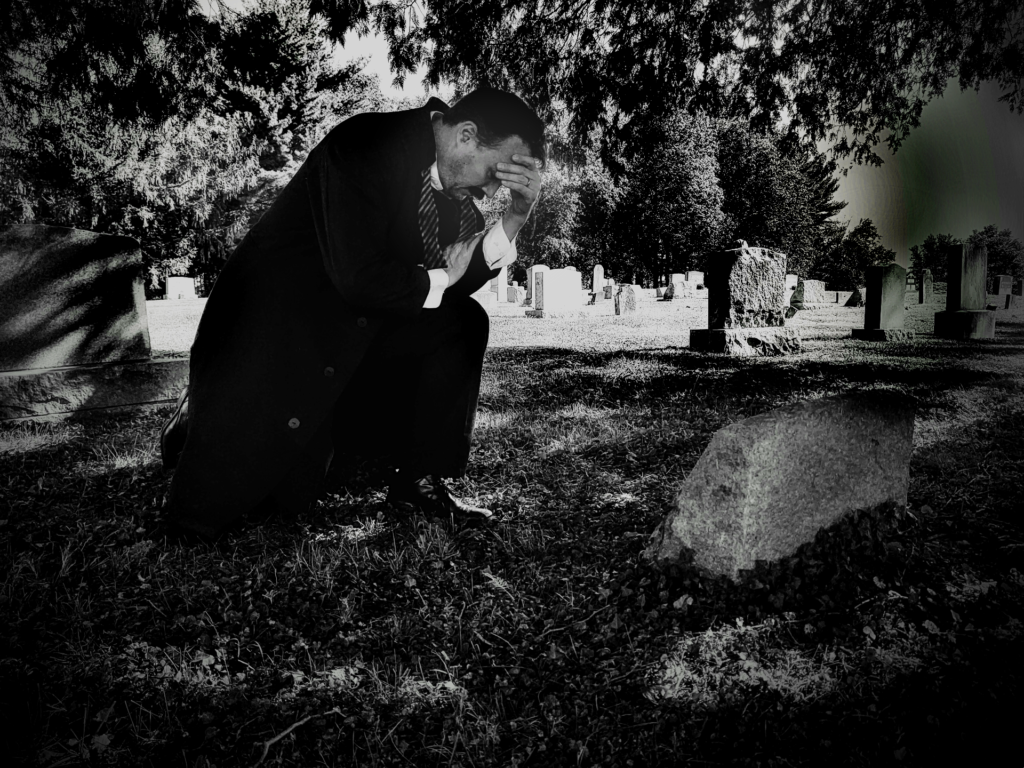
What are the particular challenges with portraying such an iconic, historical character?
John: I don’t look much like Poe. That’s one problem. But we do our best and we ask everyone to suspend disbelief. I think people have a very broad, one-note idea of who they think Edgar Allan Poe is. And that’s not exactly what C.J. wrote. I think C.J. wrote a slightly more historically-informed character. Poe is flirtatious with the Barmaid character; he’s got a gambling problem and a womanizing problem and I don’t think that those are things people generally realize were also a part of him. I think when people first see that side of him in this show they’re maybe a little struck by that and they wonder what’s going on. So getting them to accept that these are also parts of Poe can be a challenge.
But as far as problems I have, since that wasn’t specific to me, sometimes I drift out of the Virginia accent and become vaguely British. And that’s problematic, especially during “The Raven” that’s a problem I’m aware of. It’s all soft ‘r’ sounds and when you’re doing the southern soft ‘r’s, if you don’t put your vowels in the right place you end up doing British soft ‘r’s; the two aren’t really that far apart.
What would you say is the most difficult part of this particular show for you, other than keeping your accent on track?
John: Sadness. When I’m really doing it, and not just doing my externals, but really doing it, I try to carry a very deep sadness through the show. Particularly in “Annabel Lee” I really have to drown in it and wallow in it. And I don’t particularly enjoy that. But if I don’t do it, the show doesn’t work as well. The job of acting without accidentally forgetting the baseline of what I’m doing, which is sad and a little drunk and a little ill and lost, is challenging. Luckily the script is well constructed in that most of the lines follow the lines before it. There aren’t a whole lot of leaps here and there that need to come out of nowhere; there’s one or two. People often comment on ‘how do I remember the entire Raven?’ And the answer is? It rhymes. It rhymes and it tells a story so it’s easy. Also, I have the whole thing there in my hand. But I never look at it. Never.
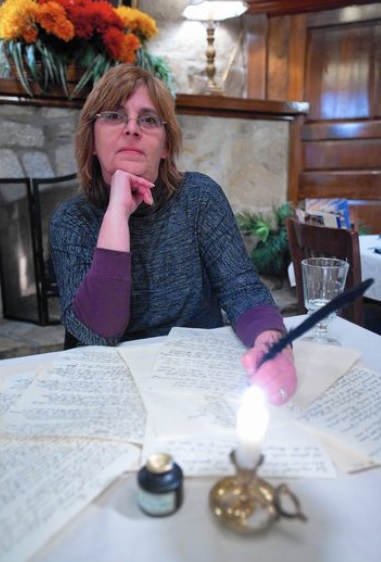
Other than “The Conqueror Worm”, is there a story or poem or a piece of Poe’s work that you had hoped would have made its way into this production or perhaps in future iterations could make it into the production?
John: There’s a poem that I really, really love called “For Annie” which is one of his last poems. It’s about a man’s profound love for Annie. But it’s unclear in the poem whether he is dead. Or maybe she’s dead? It’s been a while since I’ve read it but I think little bits and pieces of that would work well in this show. Hmm. It might be fun to involve some straight up mystery story stuff. But I guess in this show there is the mystery of ‘who is the barmaid’? that is the theme that runs through the whole show.
How are you similar to and different from Edgar Allan Poe?
John: In the broad sort of stereotypical strokes I was pretty sad as a teenager. Not for any good reason, I had a perfectly fine childhood. I was kind of a moody, emo kid. I wasn’t even demonstrably goth or emo. But I read a lot of sad stuff and did a lot of creative writing, which was all very sad and dark. I was really, really interested at the time— in my teenage years— in the way I think that Poe often is, interested in exactly what does it mean to be dead. What is death and what is it to be dead? Is it an ending? Is it a thing that can be observed and escaped? Now I’m just resigned to the idea that when you die that’s it, you’re done, it’s over. It’s tremendously horrifying.
You’ve mentioned the ‘Barmaid’ character a couple of times now. When most people see a ‘Poe show’ it’s generally an actor reading out some of his work. And this ‘barmaid’ isn’t necessarily any one woman from Poe’s life or his works. What’s it like bringing a completely fictionalized character into this universe of Poe?
John: Luckily, 90-something percent of Poe’s interactions with the ‘Barmaid’ are scripted. The script was very much complete when C.J. brought it to the first read-through and the first rehearsal. We did a small amount of figuring the whole thing out together and developing things a little bit. I think that being a part of the initial process of finalizing the script and seeing how the relationships that C.J. had written on the page really played out when you had two people doing it, all of that really helped to inform for me— as a performer— what the relationship between these two characters is. It wasn’t like I was given a text set in stone that I had to justify internally. I was given a text set in Play-Doh that we got to make some changes to. We didn’t do major changes but I feel like we all sort of molded the final product together, me, C.J., and Ashlyn. (Barmaid originator, Ashlyn Thompson.) In re-learning the script again for this current production, I hear the lines in Ashlyn’s voice.
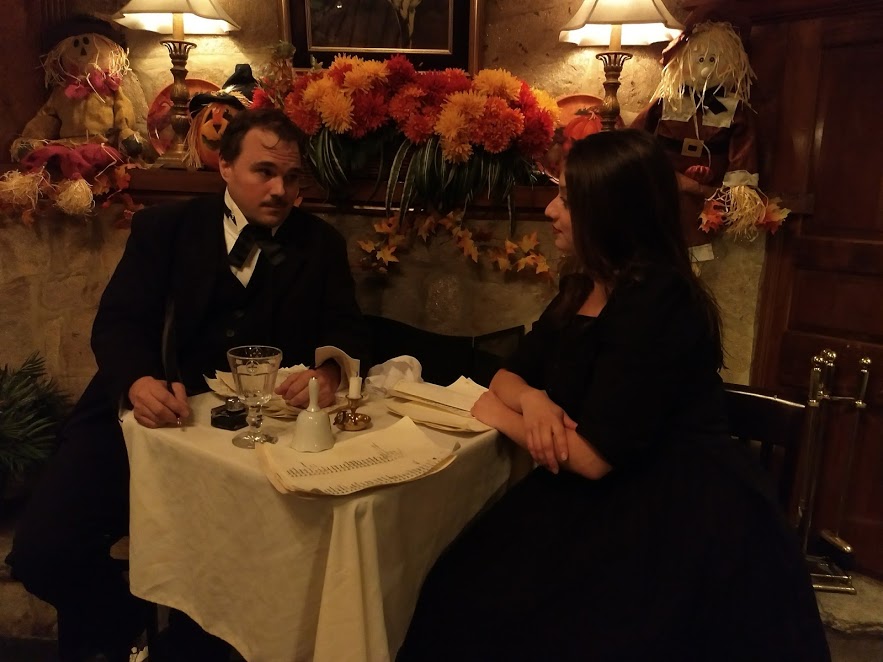
What has taking on Edgar Allan Poe in this show taught you about yourself?
John: The first thing it taught me, way, way, way back when was that I didn’t know nearly as much about Edgar Allan Poe as a person as I thought I did. I was an avid reader of the works but not really an avid biographer. That was the first thing. I talked before about how there are parts of this show that are profoundly sad and I have to dive headlong into that profound sadness. I don’t enjoy diving headlong into that profound sadness.
When C.J.’s mother passed away (early fall of 2019) and she made the difficult decision to not produce Poe that year, I was relieved. Not having to tackle that sadness during that time was a relief. I was a little happy to get away from it for a little while but I’m glad to be back to it now. No one knew we would all be taking that extra year off in 2020, and actually in my head it’s been four years since I’ve played Poe. I thought the last time we’d done it was 2017, but it was actually 2018. I think I mentally gave myself an extra year off. 2020 felt like two years, but I did miss it.
When C.J. first asked me to do it, it had been quite a while since I had done a scripted show. I’d done tons and tons and tons of murder mysteries and improv stuff but I hadn’t done anything with a traditional script in a really long time. It was really nice to get back to it.
Anything else you want to say about the overall experience? About what it’s like getting to be Poe?
John: I love the opportunity. Since I was 15 or 16 I’ve wanted to be able to recite “The Raven” in front of people, and I get to do that and that’s a lot of fun. I’m always a little afraid that there’s going to be some insane Poe historian in the audience who’s going to come up to me and have some trivia question about what Poe was doing in Richmond on July 14th in whatever year and I’m going to go, “Err— I don’t know?” So there’s always a little bit of that. We’re in the Baltimore area and Poe is obviously very beloved. It’s an honor to be able to play a character that resonates so much with so many people in a place where that person is so beloved.
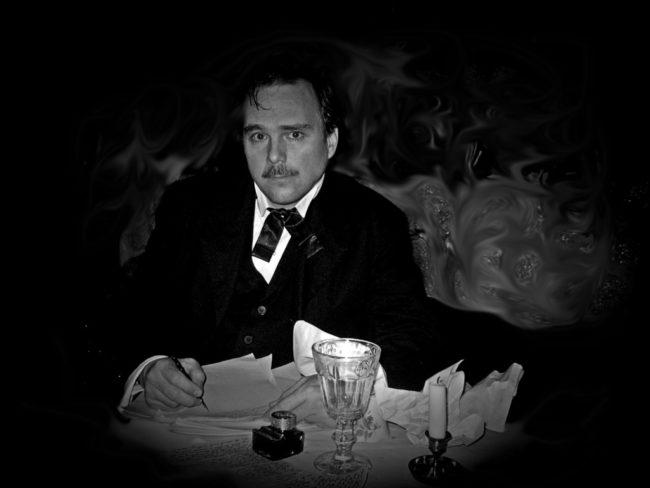
Why do you want people to come out and see Poe’s Last Stanza? It’s very different from a Poe impersonator reading “The Raven” or an exploratory deconstruction of his life. This is a very different and unique setup.
John: I think it’s for exactly that reason. I think this is a different take on Poe than people normally see. I think it’s a very different take from what people are normally expecting. Though it is dark and sad, sort of intimate and melancholy, it’s also lighthearted and fun, flirty and interactive. I think it’s a theatrical experience that people aren’t going to get in any other Poe show anywhere else.
If you had to sum up the Poe’s Last Stanza experience in one word, what would it be?
John: Spooktacular!
Poe’s Last Stanza, a Do Or Die Productions’ show, plays two performances on Monday October 18, 2021 and Monday October 25, 2021 at Hellas Restaurant and Lounge— 8498 Veterans Highway in Millersville, MD. Tickets for the performance of Monday October 18th can be found here, and tickets for Monday October 25th can be found here.

